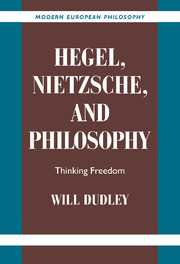Book contents
- Frontmatter
- Contents
- Acknowledgments
- List of Texts, Translations, and Abbreviations
- Introduction: Freedom and Philosophy
- PART I FREEDOM IN AND THROUGH HEGEL'S PHILOSOPHY
- PART II FREEDOM IN AND THROUGH NIETZSCHE'S PHILOSOPHY
- 5 The Place of Freedom in Nietzsche's Philosophy
- 6 The Freedom of Willing: Decadence and Nobility
- 7 Freedom beyond Willing: From Nobility to Tragedy
- 8 Freedom through Nietzsche's Philosophy
- Conclusion: Philosophy and Freedom
- Notes
- Index
6 - The Freedom of Willing: Decadence and Nobility
Published online by Cambridge University Press: 09 July 2009
- Frontmatter
- Contents
- Acknowledgments
- List of Texts, Translations, and Abbreviations
- Introduction: Freedom and Philosophy
- PART I FREEDOM IN AND THROUGH HEGEL'S PHILOSOPHY
- PART II FREEDOM IN AND THROUGH NIETZSCHE'S PHILOSOPHY
- 5 The Place of Freedom in Nietzsche's Philosophy
- 6 The Freedom of Willing: Decadence and Nobility
- 7 Freedom beyond Willing: From Nobility to Tragedy
- 8 Freedom through Nietzsche's Philosophy
- Conclusion: Philosophy and Freedom
- Notes
- Index
Summary
The Decadent Failures to Will Freely: Two Types of Sickness
In Ecce Homo, Nietzsche associates freedom with those who are capable of initiative and thinking for themselves, in contrast to those who are mere reagents, capable of acting and thinking only as a reaction to external stimuli. To understand the former, it will be easiest to begin with the latter; Nietzsche's understanding of freedom is best illuminated by his critique of those he considers most unfree.
The paradigm of reactive unfreedom for Nietzsche is what he calls the decadent. The decadent is one who experiences her own instincts as an independent and external force against which she must struggle. Such decadents are unfree because they are not capable of the self-mastery required for genuine action. Instead, they are ruled tyrannically by instincts they can neither harness nor enjoy, but to which they can only react.
DISGREGATION: THE UNFREEDOM OF NOT WILLING
In Nietzsche's terms, the decadent suffers from a disgregated will. Instead of having a will that integrates her disparate instincts into a larger whole, apart from which those instincts have no function and are not exercised, the decadent is merely a composite, an aggregate of instincts and drives whose expression is not organized by any larger purpose. As such a disgregated aggregate, the decadent is not even fully a self, and properly speaking has no will at all.
- Type
- Chapter
- Information
- Hegel, Nietzsche, and PhilosophyThinking Freedom, pp. 128 - 174Publisher: Cambridge University PressPrint publication year: 2002

